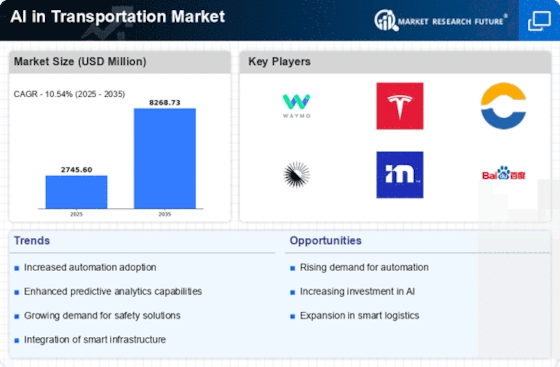Top Industry Leaders in the AI in Transportation Market

Competitive Landscape of AI in Transportation market: Navigating the Road Ahead
The transportation industry is undergoing a revolutionary transformation, fueled by the burgeoning power of Artificial Intelligence (AI). From autonomous vehicles to predictive maintenance and smart traffic management, AI promises to optimize efficiency, improve safety, and redefine how we move goods and people. This burgeoning market has attracted a diverse set of players, each vying for a piece of the lucrative pie.
Key Players:
- Alphabet
- Bosch
- Continental
- Daimler
- Intel
- Magna
- Man
- Microsoft
- Nauto
- NVIDIA
- Paccar
- Peloton
- Scania
- Valeo
- Xevo
- ZF
- Zonar
- IBM Corporation
- Volvo
Strategies Adopted by Key Players:
- Tech Giants: Google, Microsoft, and Baidu are leading the charge with their self-driving car initiatives, cloud platforms for data analysis, and AI-powered logistics solutions. Google Waymo's dominance in autonomous vehicle testing and Microsoft's Azure cloud platform with its Azure Cognitive Services for transportation are prime examples.
- Traditional Automakers: Established car companies like Toyota, Ford, and General Motors are rapidly incorporating AI into their vehicles, focusing on driver assistance features, advanced navigation systems, and predictive maintenance technologies. Ford's BlueCruise hands-free highway driving system and Toyota's Guardian Angel safety system are noteworthy examples.
- Emerging Startups: A wave of innovative startups like Cruise, Aurora, and Pony.ai are challenging established players with their cutting-edge autonomous driving technologies and unique business models. Cruise's driverless taxi service in San Francisco and Aurora's partnerships with major trucking companies are examples of their disruptive potential.
- Technology Providers: Companies like Nvidia, Intel, and Qualcomm are developing specialized hardware and software solutions for AI applications in transportation. Nvidia's Drive platform and Intel's Mobileye technology are powering advanced driver-assistance systems in many vehicles.
Market Share Analysis:
Understanding the factors influencing market share in this dynamic landscape is crucial. Key considerations include:
- Technology Leadership: Companies with the most advanced and reliable AI technologies will naturally hold an edge. Demonstrated real-world performance of autonomous driving systems, the accuracy of predictive maintenance algorithms, and the effectiveness of traffic management solutions will be key differentiators.
- Strategic Partnerships: Collaborations with traditional players, government agencies, and infrastructure providers can offer access to valuable data, resources, and market reach, solidifying market positions.
- Regulation and Policy: The regulatory landscape surrounding AI in transportation is still evolving, and companies that navigate these complexities effectively and comply with safety standards will be well-positioned.
- Consumer Adoption: Building trust and ensuring public acceptance of AI-powered transportation solutions will be critical for long-term market success.
New Entrants and Emerging Trends:
The AI in transportation market is constantly evolving, with new players and innovative trends emerging all the time. Some exciting areas to watch include:
- Electric Vehicles (EVs): The rise of EVs presents unique opportunities for AI integration, such as optimizing energy consumption, extending battery life, and enhancing charging infrastructure.
- Hyperloop and flying taxis: These futuristic transportation concepts rely heavily on AI for autonomous navigation, collision avoidance, and efficient traffic management.
- Drone delivery: AI-powered drones are poised to revolutionize last-mile delivery, offering faster and more efficient transportation of goods.
- Cybersecurity: As reliance on AI in transportation increases, robust cybersecurity measures will be essential to protect against hacking and ensure safe operation.
Investment Trends:
The potential of AI in transportation has attracted significant investment from both traditional players and venture capitalists. Key areas attracting investment include:
- Autonomous vehicle development: Startups and established players alike are pouring resources into R&D for self-driving cars and trucks.
- AI-powered logistics platforms: Companies are investing in platforms that optimize delivery routes, predict demand, and streamline logistics operations.
- Smart traffic management systems: Governments and technology companies are investing in AI-based solutions to reduce congestion, improve traffic flow, and optimize infrastructure utilization.
Latest Company Updates:
Come 2023
On September 6, Imaginnovate, a software startup, unveiled the Dynamic Pricing Engine, a new artificial intelligence technology designed to automate logistics and transportation pricing. According to Imaginnovate, the feature may calculate a logistics service price range based on a variety of factors, such as the kind of transportation, the equipment, the level of demand, and the level of competition. Later on in the contract talks, the price range can be referred to.
The artificial intelligence (AI)-enabled product Scope AI was introduced in 2023 by the Switzerland-based digital supply chain startup Nexxiot with the goal of assisting contextualised decision-making. The company's Edge and Globehopper devices travel across all major trade channels between Europe, North America, and other regions, generating billions of data points each month from which Scope AI extracts and displays critical information. Nexxiot describes Scope AI as "a conversational interface into the company's unique data on locations, status, cargo conditions, and supply chain events like delays."
Ryder System Inc. says it is preparing for a wave of artificial intelligence (AI) solutions in supply chain networks in 2023 with the launch this week of a Silicon Valley-based technology lab led by the founders of tech startup Baton, which it acquired last year.










